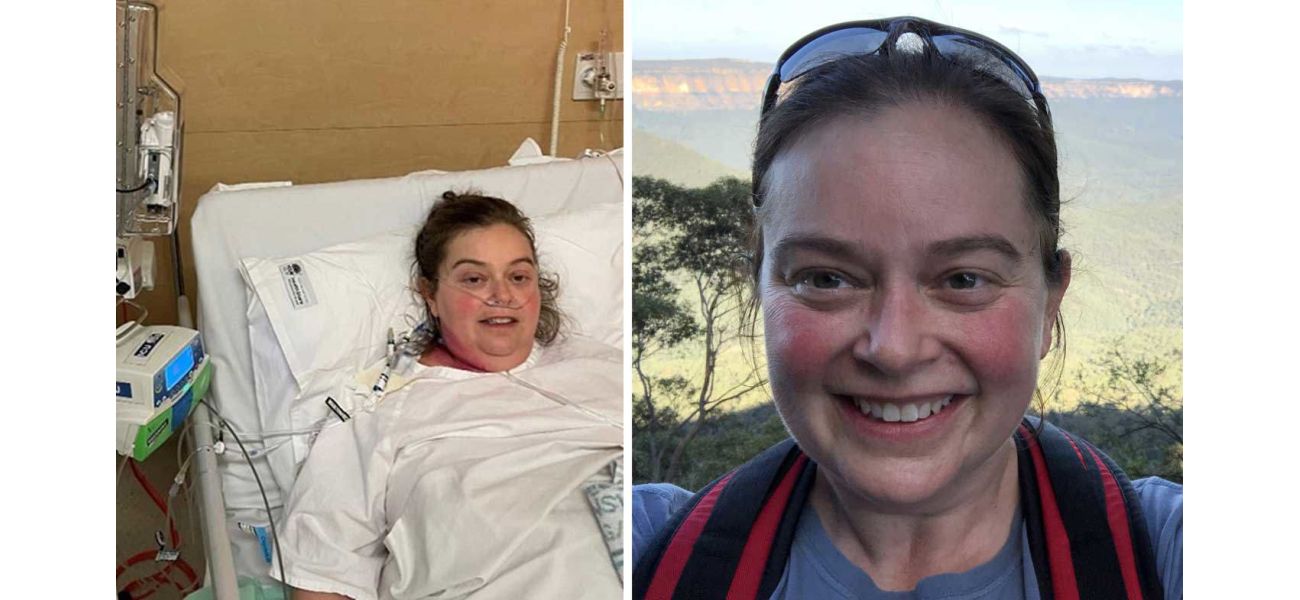Australians are demanding change as they wait almost 1.5 years for essential drugs to be added to the PBS, resulting in unnecessary deaths.
Jenny Abraham's life was limited to her apartment until a $1200-a-month medication changed everything.
September 17th 2024.

During the pandemic, Jenny Abraham's life changed drastically. It wasn't just because of the lockdowns, but also because her pre-existing condition, pericarditis, worsened. Jenny had been living with this inflammatory condition for six years, but it suddenly escalated after she contracted COVID-19 twice and had severe reactions to the vaccines. She described the pain as a constant nine-out-of-10 in her chest, leaving her struggling to breathe and often on the floor. Her doctors advised her to limit her movements and even walking around her apartment left her exhausted. Jenny said it was a difficult time, as her world seemed to be getting smaller and smaller.
Despite taking steroid medications, Jenny's condition continued to worsen. Her immunologist suggested a new medication, Anakinra, which had shown success in treating pericarditis. However, the drug was not covered by the Pharmaceutical Benefits Scheme (PBS) for this specific condition and cost $1200 a month. Jenny was hesitant due to the cost, but she knew she had to try it. The results were almost immediate and life-changing. After just three days of taking the medication, her pericarditis was gone. Jenny was amazed and grateful to be able to return to her normal activities, such as photography, hiking, and scuba diving.
Jenny was fortunate that her doctors helped her apply for the medication through her hospital's discretionary drugs fund. However, with the 12 months of funding soon to be reviewed, Jenny feared she may have to stop taking the medication. She said it had set her back 10 years in terms of her disease, and the thought of having to give it up was horrifying. Jenny was surprised at how difficult it was to access the medication, especially when it was subsidized in other countries for the same condition. She expressed her frustration with the high cost of medications that could potentially help many people.
Australia has been lagging behind countries like the US and Europe in terms of making new medications available on the PBS. According to Medicines Australia, it takes an average of 466 days for a medication approved by the Therapeutic Goods Administration (TGA) to be listed on the PBS. This wait time is too long, and many Australians are missing out on life-changing treatments. Medicines Australia is launching a campaign to reduce this wait time to just 60 days. CEO Liz de Somer stated that the process for assessing medications for the PBS has not kept up with advancements in research and innovation, and it is causing people to suffer and even die while waiting for access to new treatments.
A recent government review found that the system for acquiring medicines is too complex and results in patients waiting longer than necessary for new treatments. The final report of the review included 50 recommendations for improving the process and reducing wait times. The Albanese government has pledged to form an implementation group to review and carry out these recommendations. While industry representatives believe these recommendations will make a significant difference, patient advocacy groups like Better Access Australia believe they are too focused on cost-cutting and not enough on patient delays. Better Access Australia is calling for a 100-day target for new medications to be listed on the PBS, as they believe the report does not go far enough. They cite the five-year wait for the shingles vaccine Shingrix as an example of the extreme delays patients are facing.
Jenny Abraham's story is just one example of the struggles many Australians face when it comes to accessing necessary medications. With the government's promise to review and implement changes, hopefully, the process will become more efficient and equitable for all patients. If you have a similar story, please contact reporter Emily McPherson at [email protected].
Despite taking steroid medications, Jenny's condition continued to worsen. Her immunologist suggested a new medication, Anakinra, which had shown success in treating pericarditis. However, the drug was not covered by the Pharmaceutical Benefits Scheme (PBS) for this specific condition and cost $1200 a month. Jenny was hesitant due to the cost, but she knew she had to try it. The results were almost immediate and life-changing. After just three days of taking the medication, her pericarditis was gone. Jenny was amazed and grateful to be able to return to her normal activities, such as photography, hiking, and scuba diving.
Jenny was fortunate that her doctors helped her apply for the medication through her hospital's discretionary drugs fund. However, with the 12 months of funding soon to be reviewed, Jenny feared she may have to stop taking the medication. She said it had set her back 10 years in terms of her disease, and the thought of having to give it up was horrifying. Jenny was surprised at how difficult it was to access the medication, especially when it was subsidized in other countries for the same condition. She expressed her frustration with the high cost of medications that could potentially help many people.
Australia has been lagging behind countries like the US and Europe in terms of making new medications available on the PBS. According to Medicines Australia, it takes an average of 466 days for a medication approved by the Therapeutic Goods Administration (TGA) to be listed on the PBS. This wait time is too long, and many Australians are missing out on life-changing treatments. Medicines Australia is launching a campaign to reduce this wait time to just 60 days. CEO Liz de Somer stated that the process for assessing medications for the PBS has not kept up with advancements in research and innovation, and it is causing people to suffer and even die while waiting for access to new treatments.
A recent government review found that the system for acquiring medicines is too complex and results in patients waiting longer than necessary for new treatments. The final report of the review included 50 recommendations for improving the process and reducing wait times. The Albanese government has pledged to form an implementation group to review and carry out these recommendations. While industry representatives believe these recommendations will make a significant difference, patient advocacy groups like Better Access Australia believe they are too focused on cost-cutting and not enough on patient delays. Better Access Australia is calling for a 100-day target for new medications to be listed on the PBS, as they believe the report does not go far enough. They cite the five-year wait for the shingles vaccine Shingrix as an example of the extreme delays patients are facing.
Jenny Abraham's story is just one example of the struggles many Australians face when it comes to accessing necessary medications. With the government's promise to review and implement changes, hopefully, the process will become more efficient and equitable for all patients. If you have a similar story, please contact reporter Emily McPherson at [email protected].
[This article has been trending online recently and has been generated with AI. Your feed is customized.]
[Generative AI is experimental.]
0
0
Submit Comment





